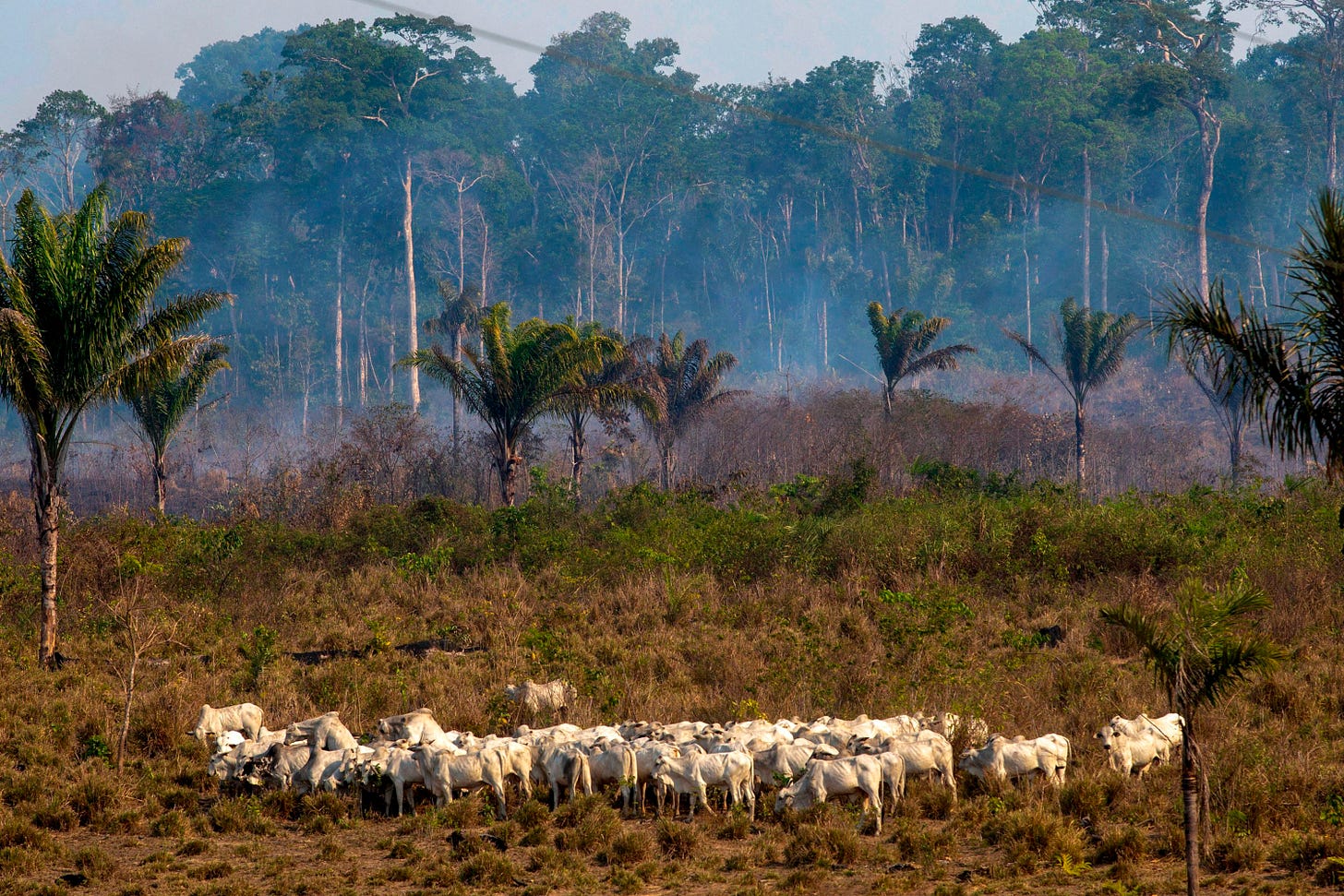
The Problem Isn't the "Lungs of the Earth." It's the Brains of the Earth.

A normal cycle of seasonal fires in the Amazon region touched off an international hysteria, with celebrities and politicians screaming that "the lungs of the Earth are in flames."
My favorite over-reaction is lefty writer Franklin Foer proposing a kind of eco-imperialism. Because Brazilian President Jair Bolsonaro has "presided over the incineration of the world's storehouse of oxygen," Foer argues that "inherited ideas about the sovereignty of states no longer hold in the face of climate change." So we shouldn't have invaded Iraq, but we should invade Brazil: "The destruction of the Amazon is arguably far more dangerous than the weapons of mass destruction that have triggered a robust response."
All that this demonstrates is the enormous contempt for science among those who loudly proclaim themselves to be on the side of science.
First, the real story in Brazil is not some abnormal, uncontrolled forest fire. Rather, the fires are primarily on land already cleared for agricultural use, and they are part of normal field-clearing practices in that part of the world.
"Natural fires in the Amazon are rare, and the majority of these fires were set by farmers preparing Amazon-adjacent farmland for next year's crops and pasture,” soberly explains The New York Times. 'Much of the land that is burning was not old-growth rain forest, but land that had already been cleared of trees and set for agricultural use.'
It is routine for farmers and ranchers in tropical areas to burn their fields to control pests and weeds and to encourage new growth in pastures. So this is another case of "progressive" neo-imperialists in wealthy countries trying to dictate to the global poor how they should remain poor.
But the big lie behind this is the old myth about the Amazon being the "lungs of the Earth," the source of the bulk of our atmosphere's oxygen—a claim that has been repeatedly debunked.
Back in 2005, Amazon expert Daniel Nepstad told the Los Angeles Times, "It's not the lungs of the world. It's probably burning up more oxygen now than it's producing." The article concludes, "Left unmolested, the forest does generate enormous amounts of oxygen through photosynthesis, but it consumes most of it itself in the decomposition of organic matter." Another researchers sums it up: "For sure, the Amazon is not the lungs of the world. It never was."
It appears Nepstad has gotten even less patient in the years since, recently telling Michael Shellenberger at Forbes that the "lungs of the Earth" claim is "bullshit." "There's no science behind that. The Amazon produces a lot of oxygen but it uses the same amount of oxygen through respiration so it's a wash."
Probably the most thorough overview of the science on this is from Peter Brannen. In among a lot of pious throat clearing about global warming and fossil fuels—necessary to reassure the Atlantic's readers that he's not a bad guy—he drops the news. "The Amazon is a vast, ineffable, vital, living wonder. It does not, however, supply the planet with 20 percent of its oxygen."
Brannen quotes geologist Shanan Peters on what would happen if not only the entire Amazon but everything else went up in flames tomorrow.
"What would happen if we combusted every living cell on Earth?" [Peters] asked. That is, Peters wanted to know what would happen to the atmosphere if you burned down not just the Amazon, but every forest on Earth, every blade of grass, every moss and lichen-spackled patch of rock, all the flowers and bees, all the orchids and hummingbirds, all the phytoplankton, zooplankton, whales, starfish, bacteria, giraffes, hyraxes, coatimundis, oarfish, albatrosses, mushrooms, placozoans—all of it, besides the humans.
Peters pulled up the next slide. After this unthinkable planetary immolation, the concentration of oxygen in the atmosphere dropped from 20.9 percent to 20.4 percent. CO2 rose from 400 parts per million to 900—less, even, than it does in the worst-case scenarios for fossil-fuel emissions by 2100. By burning every living thing on Earth. So where does our atmosphere's oxygen come from? Practically every living system on Earth uses up as much oxygen as it produces, but not quite, and over geologic time, that adds up.
The tiny remainder of photosynthetic stuff that isn't consumed and respired again by life—that 0.01 percent of plants and phytoplankton that manages to escape from this cycle of creation and destruction—is responsible for the existence of complex life on Earth.... On the time scale of tens of millions of years, such meager gifts can accumulate—apparently to 20.9 percent.
This, at least, is the best theory to date about the source of the world's oxygen. But it certainly puts the "lungs of the Earth" myth to rest. Brannen ends by trying to replace that hysteria with an overblown concern about current human consumption of fossil fuels, yet he has to admit that this, too, is overblown, at least when it comes to oxygen supplies.
Luckily, unlike carbon dioxide, we measure oxygen not in parts per million, but in parts per hundred. In other words, we have been gifted such an absurd surplus of oxygen by deep geological time, and by strange ancient life we'll never know, that it won't soon run out by our own hand, whether by deforestation or industry.
The "lungs of the Earth" myth has been repeatedly debunked for decades. But it lodged in everyone's brains some time back in the 1980s, when a bunch of celebrities and intellectuals first decided to pretend they really cared about the Amazon, and it has been endlessly repeated without question since.
That's the only real crisis we face here. The problem we have isn't with the lungs of the Earth, it's with the brains of the earth—the intellectuals whose job is to ask bold questions, but who too frequently end up repeating stale dogma instead.









